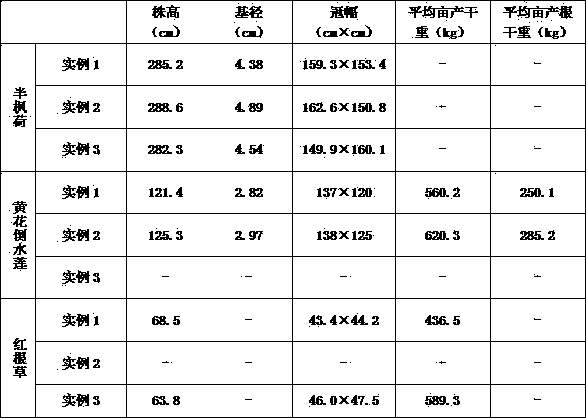A method of interplanting Chinese herbal medicines in three-dimensional composite mode in the returned farmland in karst area
A technology of three-dimensional compounding and traditional Chinese medicinal materials, which is applied in the field of plant cultivation, can solve the problems of insufficient utilization of land resources, and achieve the effects of improved protection of precious medicinal plants, easy scale promotion, and good ecological benefits
- Summary
- Abstract
- Description
- Claims
- Application Information
AI Technical Summary
Problems solved by technology
Method used
Image
Examples
Embodiment 1
[0027] The three-dimensional interplanting method of "trees + shrubs + herbs", that is, "half maple lotus + yellow-flowered water lotus + red-root grass" is adopted in the karst area for returning cultivated land, including the following steps:
[0028] 1. Forest land selection: In the southern karst mountainous area, choose flat land with fertile soil, good drainage, and no water accumulation or abandoned cultivated land on gentle slopes as the three-dimensional compound planting land for Chinese herbal medicines.
[0029] 2. Woodland cleaning: manual removal of all weeds and miscellaneous shrubs in the woodland.
[0030] 3. Dig half maple lotus planting pit: the row spacing between plants is 4m×4m, the tree rows run north-south, and the size of the planting pit is 80cm×80cm×60cm.
[0031] 4. Colonization of maple lotus: In winter, two-year-old seedlings of maple lotus with healthy growth and plant height of 1.0-1.5 m are selected for planting, and 4 kg of decomposed pig manu...
Embodiment 2
[0044] In the karst area, the three-dimensional compound interplanting method is adopted in the mode of "arbor + shrub", that is, "half maple lotus + yellow-flowered lotus".
Embodiment 3
[0046] In the karst area, the three-dimensional compound interplanting method is adopted in the mode of "arbor + herbs", that is, "half maple lotus + red root grass".
[0047] The following table 1 and table 2 show the plant morphology and yield parameters of red root grass in the second and third April of three-dimensional planting in examples 1 to 3, and the morphology and yield parameters of half maple lotus and yellow flower lotus in October; comprehensive consideration The various morphology and yield parameters of the three plants, the three-dimensional composite planting pattern of "half-flowered lotus + yellow-flowered lotus + red-rooted grass" is better than that of yellow-flowered lotus and red-rooted Before the production of lotus is formed, 891.9 kg of red root grass can be harvested per mu, and at the same time, it has little effect on the growth of yellow-flowered lotus and semi-maple lotus, which improves the planting income and land utilization rate.
[0048] T...
PUM
 Login to View More
Login to View More Abstract
Description
Claims
Application Information
 Login to View More
Login to View More - R&D
- Intellectual Property
- Life Sciences
- Materials
- Tech Scout
- Unparalleled Data Quality
- Higher Quality Content
- 60% Fewer Hallucinations
Browse by: Latest US Patents, China's latest patents, Technical Efficacy Thesaurus, Application Domain, Technology Topic, Popular Technical Reports.
© 2025 PatSnap. All rights reserved.Legal|Privacy policy|Modern Slavery Act Transparency Statement|Sitemap|About US| Contact US: help@patsnap.com


